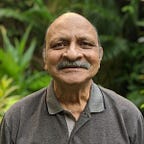Life is a Paradox
We, very often, consciously or unconsciously live life linearly, solving problems through logical processes while prodding our intellect to understand life through reducing it to its parts and then trying to put them together in different patterns to try and make sense of it all. But Life is a Paradox.
A Paradox is ‘a statement or proposition that seems self-contradictory or absurd but in reality expresses a possible truth’.
We need to junk logic to experience the meaning of a Paradox. Here are a few Paradoxes. There are more which will be addressed later.
“Don’t Change” and Change occurs
As we grow we are continuously being conditioned to see life as being incomplete, broken and something which needs to be fixed. And so we become unhappy with ourselves and continuously strive to change ourselves. And the more we strive to change, the more the same we remain. It is the same as when we strive continuously to change another person and the person resists change. The more we try to change the other person the more the person remains the same. However paradoxically when we communicate our complete acceptance of the person as he or she is and tell the person that there is no need to change; he/she is ok the way he/she is, change imperceptibly happens. The person who has been rejected feels accepted and now wants to change. The same is true with each one of us. As Carl Rogers said “We cannot change, we cannot move away from what we are, until we thoroughly accept what we are. Then change seems to come about almost unnoticed.”
We go through life wanting to be like somebody else. But coffee cannot become tea. Neither tea can become coffee. However one can explore becoming different flavours of coffee or of tea. But first one needs to accept whether one is coffee or tea. And then accept which flavour of coffee or tea one is. And whether this flavour can be improved. Before trying to discover other flavours which are possible. Each of us is unique. We need to accept our uniqueness and go on discovering the different nuances and facets of our uniqueness.
To Win is to Lose
We always nurture the desire to win. Not realising that paradoxically to win is to lose. We can win an argument but create an enemy. We can persuade others to our point of view and yet be impoverished by not considering nor including their perspectives. We lose even though we win.
We have constructed the world into an ‘us vs them’ situation. ‘I am right and you are wrong’. We feel the need to win because we require the other to define who we are not. We need to acquire an identity through annihilating the other. Winning is great but it should never come at the expense of the other’s dignity. And that is why Peter Drucker referred to this not so old tradition of Japanese culture. “Great care is taken that there be no final victory over the individuals or groups with whom one has to live and work. The Japanese know that to win such a war is to lose the peace. Whenever groups in Japan have to live together, both sides will be more concerned with making their conflict mutually productive than with winning in any absolute sense.”
Similarly yielding is not losing. Yielding can be winning. Yielding may seem like losing control for one who is insecure and driven by a ruthless mind-set. But when we look at nature we observe that a branch will bend rather than break against the strong wind. The palm tree will sway all the way down in a storm but will bounce back without snapping. One needs to know how to yield so that even in victory the other doesn’t feel defeated or humiliated or shamed.
Powerful yet Weak
We strive to acquire more and more power without realising that the more powerful one becomes the more vulnerable and insecure one feels. Most people who are arrogant or seemingly powerful are insecure. The seemingly powerful are weak. One tends to hide one’s deficiencies under the aura of invincibility. All the while experiencing the fear that one will be found out. Deep down one feels a fraud. As we grow powerful we are surrounded by sycophants who fear telling us the truth. And so we merrily go on believing that we are right till one day a fool has the courage to focus on the elephant in the room and say ‘The emperor has no clothes’.
Paradoxically the weak are powerful. This is seen while observing a small child. Weak and vulnerable and yet the master of the household. Commanding all the attention with every whimsical demand being attended to. And the child wields this power with nonchalance.
Very often our weakness makes us strong. Our vulnerability gets us the love and support of many. We rally together for the underdog while scorning the strong.
Life is a Paradox to be experienced rather than analysed to be understood.
